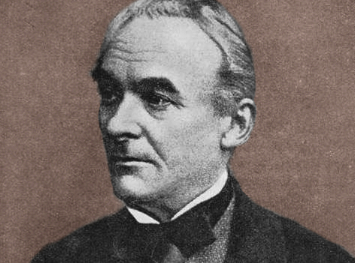
Prosper Mérimée was a French writer, archaeologist, and historian, best known for his novella Carmen, upon which Georges Bizet’s opera is based. The following letter bears no salutation, but was presumably addressed to one of Mérimée’s many lovers.
Paris, December 2, 1842.
There is in some old Spanish romance a very pleasing tale. A barber had his shop at the corner of the street, and the shop had two doors. Through one of these doors he used to pass out into the street, stab a passer-by, then hurrying into the shop, he went out the other door and bandaged the wounds of his victim. Gelehrten ist gut predigen.
I bear no grudge against your blue cashmere or your cakes; all such things are perfectly natural. I even admire coquetry and greediness, but only when one confesses them frankly. But you, who very justly aspire to be something more than a mere woman of the world, why should you have its defects? Why are you never frank with me? To give you an example of frankness, will you, or will you not, come with me to the Museum next Tuesday? If you are not willing, or if it will inconvenience or embarrass you to come, you shall receive your Etruscan seal in a little box Tuesday evening, and it will be delivered to you as naturally as possible.
Your propensity for coquetry is very amusing. You chide me for being indifferent, but if I were not so, or if I did not make a show of indifference, you would drive me mad. Why does one carry an umbrella? Because it rains…
I should like to have almost everyone shielded from derision. I have also become more humane, and the last time I saw the bull-fights in Madrid I felt none of the pleasure with which I was inspired ten years ago by a similar exhibition. In fact, I have a dread of all kinds of suffering, and for some time I have believed in mental suffering. In a word, I endeavour as far as possible to forget the ego. This, in brief, is the list of my perfections.
It is not through vanagloria that I am ambitious to become an Academician. One of these days I shall present myself for admission, but I am sure to be black-balled. I hope I may have patience and persistence sufficient to accept the disappointment and to persevere in my endeavour. If the cholera breaks out again, I may perhaps succeed in attaining a seat. No, I have not the least bit of vanagloria. I take things too literally, perhaps, but I have been disillusioned of taking a poetical view of life. However, you may be sure that you will never know either all the good or all the ill in me. All my life I have been praised for virtues that I do not possess, and slandered for faults which are not mine.
I imagine you at present as spending your evenings with your two brothers.
Good-bye.
Note: Gelehrten ist gut predigen is German for “Scholars preach well.”
From The Works of Prosper Mérimée, Ed. by George Saintsbury. New York: Bigelow, Brown & Co. (1905).
FURTHER READING
A well-sourced account of Mérimée’s literary inspirations.
Julian Barnes’s homage to Mérimée’s work as a preservationist in France.
The music inspired by Mérimée’s novella.


